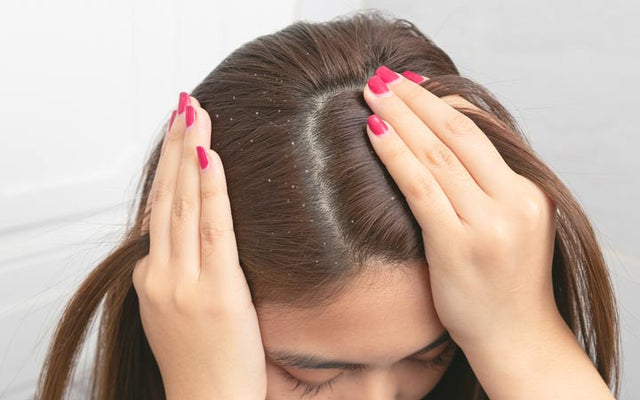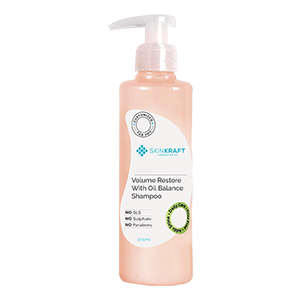You can easily tell if someone has dandruff by examining for white or yellow flakes on the scalp. But what if the flakes are combined with red, scaly patches on the scalp? Is it psoriasis or just dandruff-related symptoms?
Allow us to differentiate between dandruff and psoriasis in terms of their symptoms, causes and treatment methods. This will ensure you are not going for the wrong remedies for your condition.
Highlights:
Understanding Dandruff & Psoriasis
Dandruff [1] is a skin concern that many people experience at some point of time in their lives. It causes white flakes on the scalp that fall off on the shoulder. It is neither serious nor contagious, but many people consider this to be embarrassing.
Scalp psoriasis [2] is a skin condition in which skin cells multiply quicker than they should (upto 10 times more). This results in skin cell build-up termed plaques (red patches) that are rough to touch and covered with white skin tissue (scales).
Following are some of the top differences between dandruff and psoriasis:
|
Dandruff |
Psoriasis |
|
Dandruff may last for a while and may come back. |
Psoriasis is usually chronic. |
|
It is flaky. |
It is more flaky, and mild psoriasis can fall off as white powdery patches. |
|
Dandruff does not spread but may cause forehead acne and back acne. |
Psoriasis can spread to other parts like forehead, back of your neck & skin around the ears. |
|
It is not an autoimmune disorder. |
It is an autoimmune disorder, meaning the body's immune system attacks its own skin cells. |
Signs & Symptoms Of Dandruff & Psoriasis
Scalp Psoriasis
- Thick red and inflamed skin patches
- Extreme itching
- Skin can become dry, cracked and bleed

Dandruff
- White flakes on scalp and shoulders
- Itchy scalp
- Oily scalp
- Rash near eyebrows, nose and ears, in some cases

Causes Of Psoriasis & Dandruff
Scalp Psoriasis
Scalp psoriasis is an autoimmune disorder [3] meaning the white blood cells in the body trigger overproduction of skin cells on the scalp. Factors that trigger psoriasis are stress, extreme temperatures and infectious illnesses.
Dandruff
- Fungus: Malassezia [4] (yeast) that breeds on the oil on your scalp.
- Seborrheic dermatitis: This is oily, itchy and irritated skin that shows up as flakes on the scalp [5].
- Contact dermatitis [6]: This is a skin condition that occurs when hair care products like shampoo, gel or conditioner contain ingredients that cause scalp itchiness and flakes.
- Not washing your hair enough can cause the oily skin to flake off.
- Dry skin may leave small flakes on the scalp.
- Certain male hormones cause dandruff in men.
- People with a compromised immune system (those with HIV [7]) are likely to have dandruff.
Treatments For Dandruff & Psoriasis
Psoriasis
- Psoriasis is treated with topical creams, ointments, foams that slow down skin build up and soothe the red, inflamed patches on the scalp.
- They may contain vitamins or steroids (strong anti-inflammatory medicines) to control the inflammation.
- UV light is used in some cases to treat psoriasis, besides Ayurvedic remedies too.
Dandruff
Mild dandruff usually gets treated with a gentle shampoo. If your dandruff is severe, consider shampoos containing one of the following:
- Selenium sulfide [8]
- coal tar
- salicylic acid
- zinc pyrithione
- ketoconazole
Word of caution:
Coal tar can cause hair discoloration and may cause the scalp to become extra sensitive towards sunlight. Please consult your doctor before using it.
Who Develops These Conditions?
Scalp Psoriasis
Scalp psoriasis is common in ages between 15-35, but can occur at any age. Psoriasis in infants is a rare scenario. Genetics play a major role in causing this autoimmune disorder. Smoking, obesity, stress and infections are all linked to scalp psoriasis.
Dandruff
Dandruff can affect anyone. It is common in men when compared to women. Stress, lack of sleep and low humidity can be triggers for dandruff.
Most Affected Areas In The Human Body
Scalp Psoriasis
- Scalp
- Back
- Knees
- elbows
Dandruff
- Can happen throughout the scalp
- Back
- Chest
- Forehead
- Sides of nose and ears (less common)
When To See A Doctor?
If the symptoms of dandruff do not improve even after using anti-dandruff shampoos for over a month, you should visit your dermatologist. You may need prescription strength anti-dandruff shampoos.
Your doctor will examine your scalp and may look at a tiny piece of skin from your scalp under a microscope and send it to a lab.
If your psoriasis is accompanied by other symptoms like swelling, pain and stiffness in the joints, you may need a doctor's intervention. It is better to get diagnosed before the condition gets worse.
Wrapping Up
We hope that you no longer remain confused between dandruff and scalp psoriasis. The reason for scalp flaking can be either of the two conditions. If over-the-counter treatments do not work, a dermatologist can closely examine the cause of flaking and give appropriate medications.
1. https://www.ncbi.nlm.nih.gov/pmc/articles/PMC2887514/
2. https://www.ncbi.nlm.nih.gov/pmc/articles/PMC5389757/
3. https://www.niaid.nih.gov/diseases-conditions/autoimmune-diseases
4. https://www.ncbi.nlm.nih.gov/pmc/articles/PMC4533528/
5. https://www.ncbi.nlm.nih.gov/pmc/articles/PMC2888552/
6. https://www.ncbi.nlm.nih.gov/books/NBK459230/
Recommended Products
Was this Article helpful?
- Least helpful
- Most helpful











